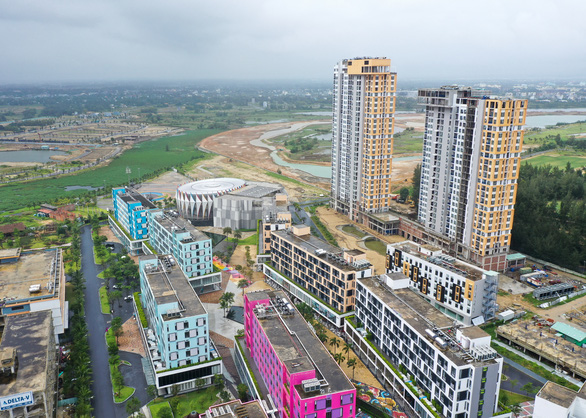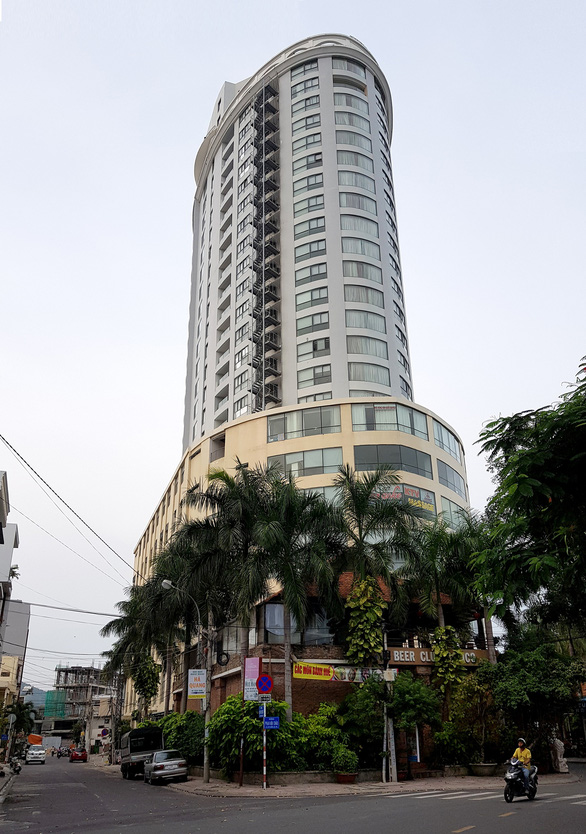As condo hotel, or ‘condotel,’ construction surges in coastal Vietnamese localities, authorities are sounding a call for legislation that would help regulate and monitor contractors’ fundraising schemes for new projects.
Condotels are currently regulated under the same laws that govern condominiums, though they operate quite differently, often much more similarly to luxury hotels in major cities and resorts that offer short-term rentals and maintain front desks.
Essentially, they are hotels that offer buyers the opportunity to own full-service condominium units which, by leveraging the hotel’s marketing and management, can be offered as short-term rentals when not in use.
The developers behind these projects typically promise investors quarterly dividends of 8-15 percent of a portion of the whole building's total profit, depending on the size of the unit, according to Vo Van Cuong, vice-chairman of the Property Association of Da Nang - a central Vietnamese city that has seen a wave of condotel development in recent years.
For investors, the dividend is seen as a way of earning a passive income or significantly cutting vacation costs while developers say the cost of paying dividends is significantly less than the exorbitant interest rates they would owe if they secured their funding through bank loans.
The condotel model also allows developers to share the financial risks of the property with investors.
This perceived mitigation of risks for both investors and developers is the driving force behind the boom in condotel projects in coastal Vietnamese localities like Da Nang, the northern province of Quang Ninh, the south-central province of Binh Dinh, the south-central province of Khanh Hoa, the southern province of Ba Ria – Vung Tau, and Phu Quoc Island off the southern province of Kien Giang.
Data from the Vietnam Association of Real Estate Brokers shows that in the first nine months of 2019 the total supply of condotels nationwide ballooned to 15,535 units, 5,482 of which were purchased by investors.
However, the fact that there is no regulation specifically governing the condotel industry in Vietnam has put both developers and investors at serious risk.
No proper legal framework
“The effective laws on real estate trading issued in 2014 have no specific articles regulating condotel sales, purchases, and transfers, leaving huge grey areas for those involved in condotel projects,” vice-chairman Cuong told Tuoi Tre (Youth) newspaper.
|
|
| The Bavico condotel building in Nha Trang City, the capital of the south-central province of Khanh Hoa. Photo: Duy Thanh / Tuoi Tre |
The term ‘condotel’ has no acutal legal definition under Vietnamese law, according to Mai Van Phan, deputy head of the General Department of Land Administration under the Ministry of Natural Resources and Environment.
This grey area in the country’s laws has left a great deal of investors without legal recourse when projects fail to turn out as expected.
The latest major example of these risks becoming reality occurred when the developer of Cocobay, a condotel project in Da Nang’s Dien Ban District, suddenly announced that it would not be able to pay investors the 12-percent dividend they had promised.
Likewise, the developer of the Bavico condotel project in Khanh Hoa’s Nha Trang City has also been unable to pay those who bought into the project the 12-percent of total profits they were promised since 2017.
Meanwhile, buyers investing in several condotel projects in Ba Ria – Vung Tau and Phu Quoc Island have been unable to obtain permanent red books – Vietnam’s version of a property ownership and use rights certificate.
According to Nguyen Thanh Tung, head of the management board for Phu Quoc Economic Zone, the reason for this is that most condotels are built on commercial land using construction permits for hotel or resort projects, making it unlawful to treat ownership of the units in those buildings the same way as ownership of those in an apartment building.
Moreover, transactions between the developers and investors of condotel projects are merely classified as civil transactions under Vietnam’s Civil Code, according to the Da Nang Department of Construction.
Nguyen Trong Ninh, director of the Housing and Real Estate Market Management Department under the Ministry of Construction, told Tuoi Tre that in April that Prime Minister Nguyen Xuan Phuc had tasked the ministry with formulating regulations on the construction of condotels.
The Ministry of Natural Resources and Environment was also asked to begin issuing legal documents on land use for these types of property.
PM Phuc also ordered the Ministry of Culture, Sports and Tourism to enact regulations on the management and trading of condotels by the end of the third quarter of this year.
However, none of these ministries have completed their given assignments.
Like us on Facebook or follow us on Twitter to get the latest news about Vietnam!


















































